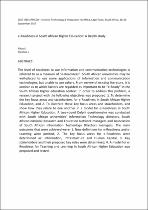JavaScript is disabled for your browser. Some features of this site may not work without it.
- ResearchSpace
- →
- Research Publications/Outputs
- →
- Conference Publications
- →
- View Item
| dc.contributor.author |
Pillay, K

|
|
| dc.contributor.author |
Erasmus, Louwrence D

|
|
| dc.date.accessioned | 2017-10-04T10:44:36Z | |
| dc.date.available | 2017-10-04T10:44:36Z | |
| dc.date.issued | 2017-09 | |
| dc.identifier.citation | Pillay, K. and Erasmus, L. 2017. e-Readiness in South African Higher Education: A Delphi study. 2017 IEEE AFRICON - Science, Technology & Innovation for Africa, Cape Town, South Africa, 18-20 September 2017 | en_US |
| dc.identifier.isbn | 978-1-5386-2774-7 | |
| dc.identifier.uri | http://hdl.handle.net/10204/9631 | |
| dc.identifier.uri | http://ieeexplore.ieee.org/iel7/8085624/8095433/08095578.pdf | |
| dc.description | Copyright: 2017 IEEE. Due to copyright restrictions, the attached PDF file only contains the abstract of the full text item. For access to the full text item, kindly consult the publisher's website. | en_US |
| dc.description.abstract | The level of readiness to use information and communication technologies is referred to as a measure of “e-Readiness”. South African universities may be well-placed to use some applications of information and communication technologies, but unable to use others. From review of existing literature, it is unclear as to which factors are regarded as important to be "e-Ready" in the South African Higher education context. In order to address this problem, a research project with the following objectives was proposed: 1. To determine the key focus areas and stakeholders for e-Readiness in South African Higher Education, and 2. To illustrate these key focus areas and stakeholders, and show how they relate to one another in a model for e-Readiness in South African Higher Education. A two-round Delphi questionnaire was conducted with South African universities’ Information Technology directors, South African National Research and Education Network managers and Association of South African Information Technology Directors managers. The main outcomes that were achieved were: 1. New definitions for e-Readiness and e-Learning were posited, 2. The key focus areas for e-Readiness were determined as: Information, Infrastructure and Human Capital, 3. Key stakeholders and their proposed key roles were determined, 4. A model for e-Readiness for Teaching and Learning in South African Higher Education was proposed and tested. | en_US |
| dc.language.iso | en | en_US |
| dc.publisher | IEEE | en_US |
| dc.relation.ispartofseries | Worklist;19551 | |
| dc.subject | Electronic readiness | en_US |
| dc.subject | e-Readiness | en_US |
| dc.subject | Electronic learning | en_US |
| dc.subject | e-Learning | en_US |
| dc.subject | ICT in Higher Education | en_US |
| dc.subject | ICT Strategy | en_US |
| dc.subject | Teaching & Learning Model | en_US |
| dc.title | e-Readiness in South African Higher Education: A Delphi study | en_US |
| dc.type | Conference Presentation | en_US |
| dc.identifier.apacitation | Pillay, K., & Erasmus, L. D. (2017). e-Readiness in South African Higher Education: A Delphi study. IEEE. http://hdl.handle.net/10204/9631 | en_ZA |
| dc.identifier.chicagocitation | Pillay, K, and Louwrence D Erasmus. "e-Readiness in South African Higher Education: A Delphi study." (2017): http://hdl.handle.net/10204/9631 | en_ZA |
| dc.identifier.vancouvercitation | Pillay K, Erasmus LD, e-Readiness in South African Higher Education: A Delphi study; IEEE; 2017. http://hdl.handle.net/10204/9631 . | en_ZA |
| dc.identifier.ris | TY - Conference Presentation AU - Pillay, K AU - Erasmus, Louwrence D AB - The level of readiness to use information and communication technologies is referred to as a measure of “e-Readiness”. South African universities may be well-placed to use some applications of information and communication technologies, but unable to use others. From review of existing literature, it is unclear as to which factors are regarded as important to be "e-Ready" in the South African Higher education context. In order to address this problem, a research project with the following objectives was proposed: 1. To determine the key focus areas and stakeholders for e-Readiness in South African Higher Education, and 2. To illustrate these key focus areas and stakeholders, and show how they relate to one another in a model for e-Readiness in South African Higher Education. A two-round Delphi questionnaire was conducted with South African universities’ Information Technology directors, South African National Research and Education Network managers and Association of South African Information Technology Directors managers. The main outcomes that were achieved were: 1. New definitions for e-Readiness and e-Learning were posited, 2. The key focus areas for e-Readiness were determined as: Information, Infrastructure and Human Capital, 3. Key stakeholders and their proposed key roles were determined, 4. A model for e-Readiness for Teaching and Learning in South African Higher Education was proposed and tested. DA - 2017-09 DB - ResearchSpace DP - CSIR KW - Electronic readiness KW - e-Readiness KW - Electronic learning KW - e-Learning KW - ICT in Higher Education KW - ICT Strategy KW - Teaching & Learning Model LK - https://researchspace.csir.co.za PY - 2017 SM - 978-1-5386-2774-7 T1 - e-Readiness in South African Higher Education: A Delphi study TI - e-Readiness in South African Higher Education: A Delphi study UR - http://hdl.handle.net/10204/9631 ER - | en_ZA |






